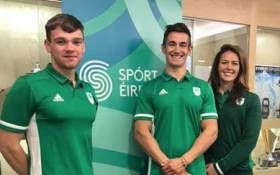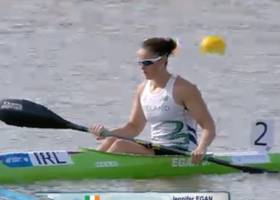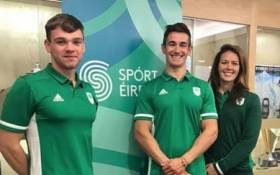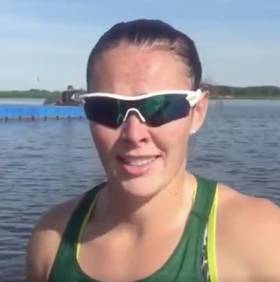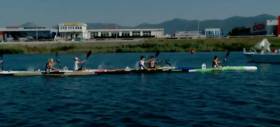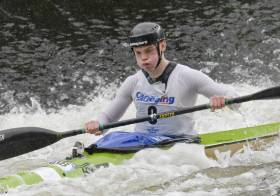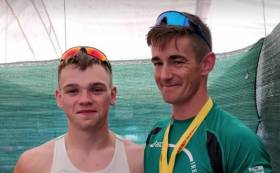Displaying items by tag: Ronan Foley
Foley and Simmons Team Up at Canoe Marathon World Championships
#Canoeing: Ronan Foley and Jonathan Simmons took 14th place in the men’s K2 at the canoe marathon World Championships in Shaoxing in China today. Quentin Urban and Jeremy Candy of France won in under two hours, while Simmons, a former British international, and Foley covered the course in two hours six minutes and 16.97 seconds.
Jenny Egan Fourth at World Marathon Championships
#Canoeing: Jenny Egan took fourth at the canoe marathon World Championships in Shaoxing in China. The long race, over 26.2 km, saw the Irish K1 paddler miss out on the bronze, which was taken by Lizzie Broughton of Britain. Hungary’s Vanda Kiszli won gold. Egan had been sixth in the short K1 race.
Ronan Foley took 10th in the Under-23 ranks, and Peter Egan 23rd in the men’s senior K1. Peter Egan had won gold in the 40 to 40 age group at the World Masters Championships, also in Shaoxing.
Young Guns Foley and Thomsen Win at 60th Liffey Descent [UPDATE]
#Canoeing: Ronan Foley (19) and Nikolai Thomsen (18) of Denmark were the fastest home as the Liffey Descent celebrated its 60th birthday today. The 32-kilometre test, with 10 weirs and a portage on the journey from Straffan to the Garda Boat Club in Islandbridge, sometimes rewards experienced competitors, but this was an exception. Both young men were competing for the first time in a K2 (double kayak) on this course, but they took advantage of the fast conditons to win a battle with experienced hands Barry Watkins and Neil Fleming. Foley and Thomsen moved in the final 1,000 metres to win in one hour 46 minutes and 40 seconds. Watkins and Fleming came home in 1:46.49.
The entry of 472 boats was blessed with a beautiful day, and there were some excellent peformances. Jenny Egan continued her record of wins in the mixed K2; she and fiance Jon Simmons were fourth at Lucan weir and fifth overall in a new best time for this boat. Malcolm Banks in the men's over 49 K1, also placed high in the overall rankings, while Peter Egan won the men's K1 on his first attempt at the class.
Liffey Descent 2019, Detailed Results (selected)
K2 – Men’s: 1 Ronan Foley (Salmon Leap CC)/Nikolai Thomsen (Denmark) 1:46.40, 2 Neil Fleming (Celbridge Paddlers)/ Barry Watkins (Salmon Leap CC) 1:46.49, 3 Sebastien Fergauven/Sebastien Jocano (Argentina) 1:47.16. Men’s O39: 1 Simon van Lonkhuyzen/Gary Mawer (Salmon Leap CC) 1:55.59, 2 David Francis/Declan Halton (Salmon Leap CC) 1:59.28, 3 Lutz Erichsen/Peter M. Jensen (Denmark) 2:04.09.
Mixed: 1 Jonathan Simmons/Jenny Egan (Salmon Leap CC) 1:51.52, 2 Deaglan O Drisceoil/Aisling Smith (Salmon Leap CC) 1:57.58, 3 Nicky Cresser/Alison Chmiel (Nottingham CC) 2:07.20.
K1 – Senior Men: 1 Peter Egan (Salmon Leap) 1:57.43, 2 Donnacha Brennan (Thomastown CC) 2:00.22, 3 Odhran McNally (Salmon Leap CC) 2:01.33. O39 men: 1 Dermot Hudson (Salmon Leap CC) 1:59.36, 2 Stewart O’Regan (Salmon Leap CC) 2:04.12, 3 John Parker (Worcester CC) 2:13.19. O49: 1 Malcolm Banks (Salmon Leap CC) 2:02.50, 2 James Butler (Nottingham CC) 2:06.38, 3 Neil Blackman ( Royal Leamington Spa) 2:08.39. Junior men: Senan Forristal (Thomastown Paddlers) 2:01.04, 2 Matthew McCartney (Celbridge Paddlers) 2:08.077, 3 Alex O’Brien (Celbridge Paddlers) 2:20.15.
Senior women: 1 Margaret Farrell 2:56.23, 2 Sara Griffin 3:10.46, 3 Amy Walsh 3:21.38.Junior women: 1 Aoibhin Ni Broin (Galway CC) 2:39.23.
T2 – Sean Martin/Eddie Martin (Piragua Madrid/Richmond CC) 2:14.39, 2 Fergus Cooper/Morgan Cooper (Canoeing Ireland) 2:16.07, 3 Lar O’Brien/Michael O’Farrell (Kilcullen CC) 2:19.00.
Wildwater – Open: 1 Darragh Clarke (Wild Waater KC) 2:15.4, 2 Maggie Dilai (Nottingham KC) 2:17.49, 3 Alex Sheppy (Devizes CC) 2:26.26
K1 Class B – Men: 1 Colin Wong (Canoeing Ireland) 2:29.46, 2 Mark Redmond (Wild Water KC) 2:30.45, 3 Padraig Dunne Athy Rowing and CC) 2:37.25. O39: 1 Gerry Murphy (Canoeing Ireland) 2:32.12, 2 Edward Broekaart (Canoeing Ireland) 2:34.33, 3 Gary McClure (Belfast CC) 2:36.05 Junior men: 1 Cameron Bannatyne (Soar Valley) 2:18.33, 2 Ethan Dowling (Ribbontail Paddlers) 2:47.03, 3 Michael O’Herlihy (Wild Water KC) 2:48.18
K1 Class C: Men: 1 Craig Stratford (Virginia KC) 2:54.10, 2 Brian James (Cabra KC) 2:56.59, 3 Wojciech Szydlo (Silverbridge KC) 2:59.48. O39: 1 Terry Smith (Athy Rowing and CC) 2:37.10, 2 Andrew Redmond (Wild Water KC) 2:39.30 3 Dermot Forristal (Thomastown Paddlers) 2:39.44. Junior men: 1 Daniel Stratford (Virginia KC) 2:38.40, 2 Barry Stratford (Virginia KC) 2:41.29, 3 Alex Russell (Canoeing Ireland) 2:44.35.
Women: 1 Ciara Gurhy (Wild Water KC) 2:47.45, 2 Helen Flanagan (Share Centre) 2:55.53, 3 Yvonne Crosse (Phoenix KC) 3:04.21. O39: 1 Fiona Kelly (Wildwater KC) 2:49.50, 2 Yvonne Kelly Castleknock Community Collge KC) 2:50.38, 3 Mary Fitzgerald (Athy Rowing and CC) 2:58.27. Junior women: 1 Emma Fay (Ribbontail Paddlers) 3:14.20, 2 Rachel Alexander (Virginian KC) 3:20.04.
C1 – 1 Stephen Dunne (Mullingar CC) 3:11.16, 2 Andy Jeffers (Phoenix CC) 3:26.30, 3 Paul Magee (Canoeing Ireland) 4:05.55
C2 - 1 Ben Boland/Roger McClure (Kilkenny Aqua CC) 2:37.26, 2 Gearoid Jones/James Dillon (DIT CC) 2:47.54 3 Gerry Coonan/Gerry O’Brien (Wild Water KC) 3:00.42. C2 (mixed) – 1 Elaine Alexander/Richard Hobson (CANI/Lisburn City Paddlers) 2:57.58, 2 Colin Lively/Jacqui McVicar (Share Centre) 3:06.04, 3 Eamonn Dodd/Lynda Byron (Wild Water KC) 3:15.50.
C3 – 1 D Comerford/S O’Neill/S O’Neill (Thomastown Paddlers) 2:48.24, 2 Y Kalogerakis/ D Holden/B Comerford (Canoeing Ireland) 2:51.20, 3 K Durkan/S Durkan/M Fitzsimon (Celbridge Paddlers) 3:00.20.
Best Club (combined K1 and K2 times) : Salmon Leap Canoe Club, Leixlip
International Trophy: Ireland.
Ronan Foley Sixth in World Under-23 Final
#Canoeing: Ronan Foley finished sixth in the A Final of the men’s K1 1,000 metres at the canoe sprint World Under-23 Championships today in Pitesti, Romania. Thomas Green of Australia won gold, with Germany’s Jakob Thordsen second and Hungary’s Adam Varga third. Foley, in his first year since moving up from junior, came in 8.24 seconds behind Green.
Jenny Egan Qualifies for Second B Final at European Games
#Canoeing: Jenny Egan qualified for the B Final of the K1 200 metres at the European Games in Minsk. The Ireland paddler took seventh in her semi-final. “I’m really happy to make the B Final in the K1 200m, it’s a big improvement from a few weeks ago at the World Cups. It was a good race, it was quite windy out there, quite a side wind so you had to adjust your technique to cope with the conditions. But I’m happy with it and through to the B Final of the 200 tomorrow,” Egan said.
She has also qualified for the B Final of the K1 500 and will compete in the final of the K1 5,000m.
Ronan Foley was eighth in his K1 200m semi-final and missed out on a place in the finals. He is set to race in the K1 5,000m on Thursday.
#Canoeing: Jenny Egan will compete in the B Final of the women’s K1 500 metres at the European Games in Minsk, Belarus. The Ireland canoe sprint paddler finished fifth in her semi-final.
Ronan Foley produced a personal best time in his semi-final of the K1 1,000 metres, though he missed out on the finals.
Canoeing Honours its Stars in New Ceremony
#Canoeing: The inaugural Canoeing Ireland National Awards at the Spa Hotel in Lucan on Saturday night were a success. The prizes were spread across a range of disciplines, with young competitors to the fore. Jenny Egan and Ronan Foley were honoured in both sprint and marathon categories. One of the most popular awards on the night went to Aido Barber of canoe polo. He was named the volunteer of the year.
The keynote speaker was the president of the Olympic Federation of Ireland, Sarah Keane.
Canoeing Ireland National Awards
Freestyle: Senior Male: Dave McClure. Junior Female: Aoife Hanrahan, Junior Male: Sean Noonan.
Marathon: Sen: Jenny Egan, Barry Watkins. Jun: Ronan Foley
Polo: Sen: Rachel Molloy, Mark McCormack. Jun: Ciara Gurrhy, Zeke Wilson.
Slalom: Sen: Aisling Conlan, Liam Jegou. Jun: Maeve Martin, Tom Morley.
Sprint: Sen: Jenny Egan, Patrick O’Leary (paracanoeist). Jun: Kate McCarthy, Ronan Foley.
Surf: Sen: Aisling Griffin, Michael Barry. Jun: Megan Gamble, Jamie O’Brien
Whitewater: Darragh Clarke (junior male)
Community Impact: Kilkenny Aqua Canoe Club
Event of the Year: UCD Varsities
Team of the Year: Kilcock Demons
Volunteer of the Year: Aidrian Barber
World Championship Silver for Ireland's Foley
#Canoeing: Ronan Foley capped a terrific year with a silver medal in the junior K1 at the canoe marathon World Championships in Vila de Prado in Portugal.
Thorbjorn Rask of Denmark won gold through an early breakaway, while Foley took silver just ahead of Vince Petro of Hungary.
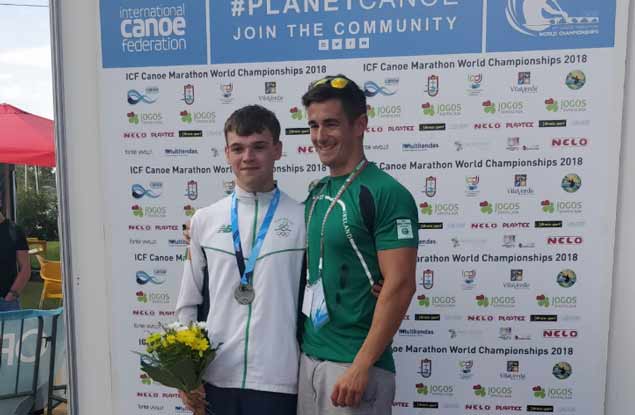 Ronan Foley (left) and coach Jon Simmons
Ronan Foley (left) and coach Jon Simmons
#Canoeing: Ronan Foley produced another promising result at the canoe sprint World Junior and Under-23 Championships in Plovdiv in Bulgaria. The Ireland paddler won the B Final of the junior men’s K1 500 metres. He had also won the B Final of the K1 1,000 metres. He placed 10th overall in both K1 500 and K1 1,000.
Canoe Sprint Junior World Championships, Plovdiv, Bulgaria (Irish interest)
Men, K1 500m – B Final (Places 10 to 19): 1 Ireland (R Foley) 1 min 41.398 sec.
#Canoeing: Ronan Foley won the B Final of the Junior K1 1,000 metres at the Canoe Sprint World Junior and Under-23 Championships in Plovdiv, Bulgaria, today. The Kilcullen man had over two seconds to spare over his nearest rival, Philip Miles of Britain. The win places him 10th overall.
Just three weeks ago, Foley took gold in the canoe marathon European Championships in Croatia.
Canoe Sprint World Junior Championships, Plovdiv, Bulgaria
Junior K1 1,000 – B Final (Places 10 to 18): 1 Ireland (R Foley) 3 min 38.463 sec.


























